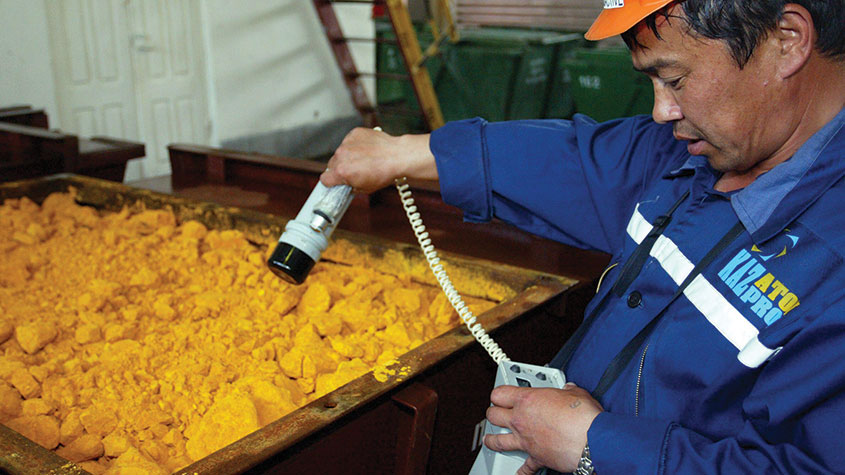Gervais Williams: three great micro-caps to tuck away now
In a stagnant world, isn’t it great to find small companies investing for growth? Gervais Williams tells Merryn Somerset Webb what his favourites are.

Get the latest financial news, insights and expert analysis from our award-winning MoneyWeek team, to help you understand what really matters when it comes to your finances.
You are now subscribed
Your newsletter sign-up was successful
Want to add more newsletters?

Twice daily
MoneyWeek
Get the latest financial news, insights and expert analysis from our award-winning MoneyWeek team, to help you understand what really matters when it comes to your finances.

Four times a week
Look After My Bills
Sign up to our free money-saving newsletter, filled with the latest news and expert advice to help you find the best tips and deals for managing your bills. Start saving today!

In a stagnant world, isn't it great to find smallcompanies investing for growth? Gervais Williamstells Merryn Somerset Webb what his favourites are.
"The market has been displaying inefficiencies." That's what Gervais Williams told me just before the cameras started rolling for our interview last month. That's fund manager speak for "there's stuff out there that's way too cheap" exactly what we like to hear from managers known to be good stockpickers. I figure it might not be polite to demand a list of cheap micro-caps to buy right away.
So I wander around the topic a bit first. What's causing these inefficiencies? A very unsettled market, says Williams. Most larger company shares recovered reasonably quickly after the turmoil at the start of the year, but down at the illiquid, smaller end of the market that hasn't happened so much: "some share prices... have just moved too far and have not recovered as much as they should, and so you've got extreme inefficiency at the bottom end".
MoneyWeek
Subscribe to MoneyWeek today and get your first six magazine issues absolutely FREE

Sign up to Money Morning
Don't miss the latest investment and personal finances news, market analysis, plus money-saving tips with our free twice-daily newsletter
Don't miss the latest investment and personal finances news, market analysis, plus money-saving tips with our free twice-daily newsletter
Is that why his micro-cap fund, Miton UK MicroCap Trust, was set up, to capitalise on these inefficiencies (it launched in 2015)? It is the right time to invest in very small firms, says Williams. Think of micro-caps as being local rather than international businesses, and thus less dependent on the world economy than others. "If the world's not growing, you need micro-caps." Small company share prices also often move separately to the market as a whole: "having things which are zigging and zagging at different times means that the overall volatility" of portfolios holding them is "smoother".
Finally, they are still "very underrepresented in most people's portfolios". Most hold primarily mainstream benchmark stocks, with "quite a few mid-caps, not many small caps and very few micro-caps". That should start to change: as big firms come under pressure to cut dividends, "we think that there's a greater interest in widening the opportunity set" to companies that can do well regardless of the wider environment. That in turn will see capital "allocated away from bigness into smallness", which should drive share-price growth too.
Hunting down interesting companies
Enough small talk. We have an interesting discussion on pensions freedom and the dividend policies of large firms (he's keen on Legal & General), but you can watch that at MoneyWeek.com. I move on to what I know you really want to know. Tell us about some of the interesting firms you have seen recently, I say. Williams visits about 40 companies a month, looking for productivity growth (you need to "be in companies that are going to invest for commercial payback"), good management, and solid balance sheets (he would prefer the firms he invests in to keep risk low by avoiding debt wherever possible). He appears to find them all fascinating.
A few weeks ago he visited Amino Communications, a market leader in set-top boxes. It's doing "terrifically well". It recently made an acquisition that unsettled its share price: it is on a price/earnings (p/e) ratio of 12 for this year, and ten for next. It has net cash and has been growing at 10% a year for the last five years. It also yields 5.25%. "The share price is probably too low because of its wobble, but growing income will drag that up in time."
Another interesting firm is "tiny" (market cap of around £20m) Coral Products. It makes plastic products, injection mouldings things such as supermarket crates, which are too heavy and bulky to make in China and ship home. It's made two good acquisitions recently (one as a result of another firm being dragged into administration by its pension liabilities) and is growing nicely. Yours for a p/e of around ten, falling to eight next year, plus a yield of 4.5%. Isn't it wonderful, says Williams, "to meet companies which are investing and able to have the confidence to grow their business when the world's in such an uncertain period".
Three tips of the decade
I ask which firms Williams would suggest if I were to ask for three to put aside to pay my children's university fees (there's a decade in this). His first is A&J Mucklow (LSE: MKLW), an industrial property business that dominates the market around Birmingham. The key here is "reshoring". Over the last 20 years, the trend has been to move manufacturing capacity to the Far East and other places. That has meant warehouse overcapacity at home, and industrial properties in the Midlands selling for £5 or £6 a square foot, "which, compared with Bristol or Slough, is ridiculously cheap".
But now "some people are coming back into the UK". A&J Mucklow is in the right place for this recovery: it has real property in the right places with rental prices and overall income rising nicely. This one isn't in the micro-cap portfolio, but "just shows what the opportunity is".
One that is in the portfolio is Fulcrum Utility Services (LSE: FCRM), which installs gas and electricity pipes into small housing estates, industrial estates, local authorities, etc. It's on a p/e of about 12, has just declared its first dividend, and has net cash of "about £5.5m". The third is one Williams has just seen, Seeing Machines (LSE: SEE). It produces image-processing technology that tracks the movement of a driver's head to see if he is tired or distracted handy in mining, rail and aviation, says Williams.
If you are driving a giant mining truck "it's important you don't nod off because you were gambling last night". This is an "immature company" it isn't making profits but "it's in recovery mode" and is "very undervalued". It is unusual for Williams to hold something paying no dividend, but it is in the MicroCap trust because in three to five years it will: "as their investment comes through, the cash payback on that could be great".
We leave it there. Williams has already met one firm, has four more to see when he leaves me (the visits are "the best part of the job") and we all have enough tips to be getting on with. I can't guarantee you success here: the MicroCap Trust is too new to have a proper performance record. But you can take comfort from the fact that Williams has seen long-term success with his Diverse Income Trust (see box): it's up 54% over the last three years against a UK equity income sector average of 18%.
Fact file: Gervais Williams

Gervais Williams has been the managing directorat Miton since 2011. He manages a range of funds,including the Miton UK Smaller Companies fund,the Miton UK MicroCap Trust (LSE: MINI) and theDiverse Income Trust (LSE: DIVI). The latter hasperformed strongly, returning 54.6% over the pastthree years, compared to 17.8% for comparablefunds. Indeed, it has gained 13.8% over the pastyear, at a time when the sector is down by nearly5%. Meanwhile, Miton UK Multi Cap Income, which he also runs, wasranked second out of 85 income funds in 2015.
Williams has been an equity fund manager for more than three decades.He has written three investment books: Slow Finance: Why InvestmentMiles Matter; The Future is Small: Why Aim will be the World's BestMarket Beyond the Credit Boom and most recently Fast Finance: Does theFinancial World Allow for Social Loafing?
Get the latest financial news, insights and expert analysis from our award-winning MoneyWeek team, to help you understand what really matters when it comes to your finances.

-
 Early signs of the AI apocalypse?
Early signs of the AI apocalypse?Uncertainty is rife as investors question what the impact of AI will be.
-
 Reach for the stars to boost Britain's space industry
Reach for the stars to boost Britain's space industryopinion We can’t afford to neglect Britain's space industry. Unfortunately, the government is taking completely the wrong approach, says Matthew Lynn
-
 These 2 stocks are set to soar
These 2 stocks are set to soarTips The returns from these two aluminium and tin stocks could be spectacular when the commodity cycle turns says David J Stevenson.
-
 The best ways to buy strategic metals
The best ways to buy strategic metalsTips Weaker prices for strategic metals in the alternative-energy sector are an investment opportunity, says David Stevenson. Here, he picks some of the best ways to buy in.
-
 A lesson for investors from a ill-fated silver mine
A lesson for investors from a ill-fated silver mineAnalysis Mining methods may have changed since the industry’s early days, but the business hasn’t – digging ore from the ground and selling it at a profit. The trouble is, says Dominic Frisby, the scams haven't changed either.
-
 The natural resources industry is in a tight spot – which is bad news for the rest of us
The natural resources industry is in a tight spot – which is bad news for the rest of usOpinion The natural resources industry is in a bind. We need it to produce more energy and metals, but it has been starved of investment, plagued by supply chain issues, and hobbled by red tape. That’s bad news for everyone, says Dominic Frisby.
-
 How to invest in the copper boom
How to invest in the copper boomTips The price of copper has slipped recently. But that’s temporary – the long-term outlook is very bullish, says Dominic Frisby. Here, he explains the best ways to invest in copper.
-
 Why investors should consider adding Glencore to their portfolios
Why investors should consider adding Glencore to their portfoliosTips Commodities giant Glencore is well placed to capitalise on rising commodity prices and supply chain disruption, says Rupert Hargreaves. Here’s why you should consider buying Glencore shares.
-
 How to invest in the multi-decade boom in industrial metals
How to invest in the multi-decade boom in industrial metalsTips The price of key industrial metals has already begun to rise. The renewable energy transition will take them higher, says David Stevenson. Here's how to profit.
-
 Avoid China’s stockmarket – here’s what to invest in instead
Avoid China’s stockmarket – here’s what to invest in insteadOpinion China’s stockmarket is not a good place for investors to be. But you can't just ignore the world's second-largest economy, says Dominic Frisby. Here, he picks an alternative China play.